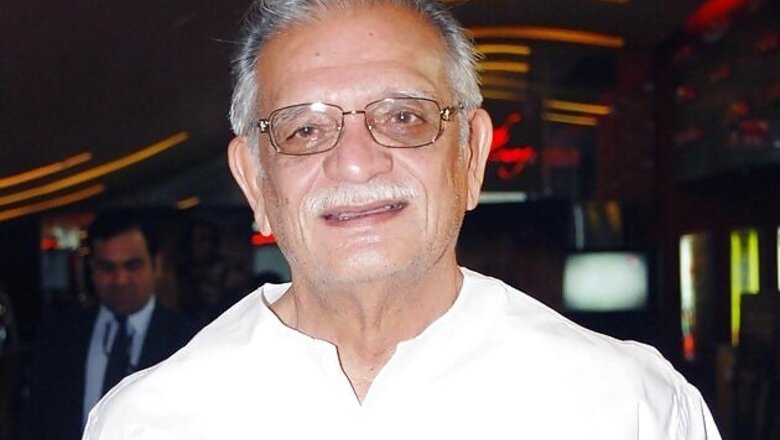
views
The world has always been appreciative of the soul-stirring poetry and works of Gulzar, and it was the same when he was named for the coveted Dadasaheb Phalke Award. Within minutes, the net exploded. Several popular film personalities including Lata Mangeshkar, Asha Bhosle took to Twitter to congratulate Gulzar's for being named the highest official recognition for film personalities in India.
Lyricist-filmmaker Gulzar, who is respected for penning memorable hits such as 'Tujhse Naaraaz Nahi' and 'Tere Bina Zindagi Se' and directing critically acclaimed films like 'Aandhi' and 'Mausam', said he felt "fulfilled" on being recognised for his work. "I am happy and honored. It is national honor. It is a feeling of fulfillment of not one song, screenplay, but the total work one does. I feel blessed to get this honor. I am thankful to everyone for their love and support. I am thankful to the jury members. It is a way of respect which says your work is loved and you are on the right path," Gulzar said.
Melody queen Lata Mangeshkar, who has collaborated with Gulzar in several songs like 'Is Mod Se', 'Tere Bina Zindagi Se', 'Beeti Na Bitai Raina' and 'Tujhse Naraz Nahin Zindagi', said she is very happy to receive the news of the award to be bestowed on the 79-year-old lyricist. "Namaskar. Director, writer and poet Gulzar sahab has been today chosen for the prestigious Dada Saheb Phalke award. My heartiest congratulations to him. My most favourite song written by him is 'Naam Gum Jaayega' from the 1977 film 'Kinara'," Mangeshkar posted on Twitter, along with a link of the song. While Gulzar's daughter tweeted, ""Dadasaheb Phalke award for my father. So proud! Gulzar," actor Anupam Kher was also quick to take to the micro-blogging site to share his thoughts. "Jai Ho, Jai Ho, Jai Ho. Gulzar gets Dada Saheb Phalke award," he tweeted.
Born in 1934 in Punjab in pre-independence India, Gulzar started his career in 1956. As a lyricist, he got his first break in Bimal Roy's "Bandini". He then worked with leading composers like Sachin Dev Burman, Salil Chowdhury, Shankar-Jaikishan, Hemant Kumar, Laxmikant-Pyarelal, Madan Mohan, Rajesh Roshan, Anu Malik and the new age Shankar-Ehsaan-Loy. Gulzar also had successful partnerships with Rahul Dev Burman, A.R. Rahman and Vishal Bhardwaj.
Besides being awarded the Padma Bhushan in 2004 for his contribution to the arts, and the Sahitya Akademi Award in 2002, Gulzar has National Film Awards and 20 Filmfare Awards to his credit. At the 81st Academy Awards, he bagged the Academy Award for Best Original Song for popular track 'Jai Ho' for the Oscar-winning film 'Slumdog Millionaire'. The same song also won Gulzar a Grammy Award in the category of Grammy Award for Best Song Written for a Motion Picture, Television or Other Visual Media.
Gulzar, who started career in films as a lyricist, has not only written dialogues and screen plays, but has also directed numerous critically acclaimed Hindi films. A learner with Bimal Roy, Gulzar started working with Hrishikesh Mukherjee after his death. After writing for 'Kabuliwala', 'Sannaata', 'Do Dooni Chaar Biwi Aur Makan' and many popular films, he turned director with 1971 film 'Mere Apne'. His lyrics As a lyricist, he won plaudits for many songs like the memorable 'Do deewane shehar mein', the breezy 'Ek akela shehar mein', the thought-provoking 'Chood aye hum who galiyaan', the foot-tapping 'Chaiyya Chaiiya' and the oh-so-cool 'Kajra re' and many more.
Gulzar, who wowed everyone with his ability to delve deeper into human relationships and thought processes, took up social and domestic issues in his films. Here's an insight into his most memorable works.
'Mere Apne', Gulzar's first directorial venture and was a remake of the National Award winning Bengali film 'Apanjan'. The film put forth the deplorable condition of elderly people. It showed how an old widow, who is brought to town by a distant relative on the pretext to live a happy life, ends up being his maid and doing all household chores.
Gulzar's 'Koshish', which was released in 1972, was considered a landmark film in the history of Indian cinema. The film, starring Sanjeev Kumar and Jaya Bachchan, put forth the expectations, difficulties and struggle of the deaf-mute couple. 'Koshish' which was an attempt to sensitize people towards those who are differently-abled, was remade in Tamil as Uyarndhavargal in 1977 with Kamal Haasan and Sujatha in key roles. Gulzar won National Award for best screenplay.
While 1971 film 'Anand' helped Rajesh Khanna immortalize himself with his moving performance in Hrishikesh Mukerjee's Anand, Gulzar , who one of the writers was appreciated for the manner in which the film put across the message of the certainty of death. Gulzar bagged Filmfare Award under the Best dialogue category.
If 'Namak Haram' made headlines for featuring megastars Rajesh Khanna and Amitabh Bachchan, it also grabbed everyone's attention for explaining the clash of contrasting economic thoughts in the most convincing ways. The film wasn't just a hit at the box office, but also got Gulzar win Filmfare awards for best dialogue.
Directed by Gulzar, 1975 film 'Mausam' was loosely based on the novel, 'The Judas Tree' by A.J. Cronin. The film revolved the life of Dr. Amarnath Gill (Sanjeev Kumar), who falls for a girl (Chanda) from Darjeeling and leaves the place due to untoward events and, returns decades later to find Chanda's daughter, who was sexually abused by her mother's brother-in-law, ends up being at a brothel. 'Mausam won national films awards under Second Best Feature Film and gulzar was awarded Filmfare Award under the Best Director category.
'Aandhi', an Indian political drama film was directed by Gulzar and released in 1975. The film hit the headlines as it was reportedly inspired by the life of then-Prime Minister Indira Gandhi and her bond with her estranged husband. The movie won plaudits for its songs, story and acting prowess of Sanjeev Kumar and Suchitra Sen.
Directed by Gulzar, 'Ijaazat' was based on Subodh Ghosh's Bengali story Jatugriha. The film which starred Rekha, Naseeruddin Shah and Anuradha Patel in key roles. The film revolved around a separated couple who accidentally meet at a railway station waiting room. Even though the film belonged to the art-house genre, it won two National Film Awards in the music category.
'Parichay' was based on a Bengali novel, 'Rangeen Uttarain' by Raj Kumar Maitra. Directed by Gulzar, the film revolved around Ravi who has to tutor five stubborn grandchildren of a wealthy man (Pran). Jeetendra was impressive in his attempt to deal with the kids with patience and persistence and manages to woo the elest granddaughter (Jaya).
Based on Shakespeare's play 'The Comedy of Errors', Gulzar's 'Angoor' managed to strike to the right chord with the viewers. The film was about two pairs of identical twins who were separated at birth and how their lives get complex when they meet in adulthood.
'Libaas' dealt with the issue of adultery. Only a gutsy Gulzar could think of taking up such a bold subject at that time. The film won critical acclaim in international film festivals but could never be released in India.
Gulzar's 'Meera' was about a Hindu saint-poet who gave up generous comforts in pursuit of her love for Lord Krishna. The film depicts the life and times of Meera from a historical and not mythological perspective.
'Namkeen' was based on untouched facets of Indian society particularly in rural areas.
Gulzar's 'Kinara' explained the happiness of being sad.
Another film for which Gulzar was appreciated was 'Maachis'. Produced by R. V. Pandit and directed by Gulzar, the film depicted the circumstances around the rise of the Sikh insurgency in Punjab in the 1980s and outlined the transformation of a young man to a terrorist determined on wreaking vengeance.
Based Gulzar's own short story 'Hu Tu Tu' was the director's take on politics in India. The film was about the impact politics leaves with on the life of an ordinary family from Shewri village.



















Comments
0 comment